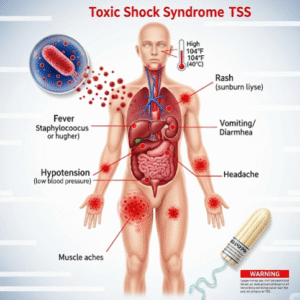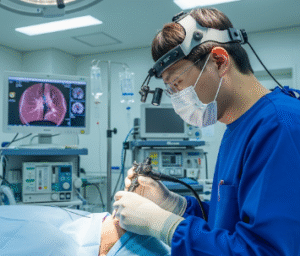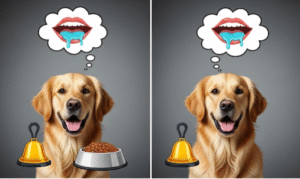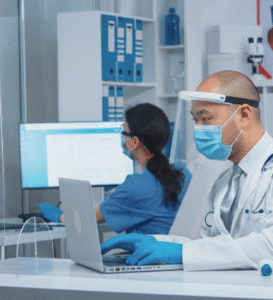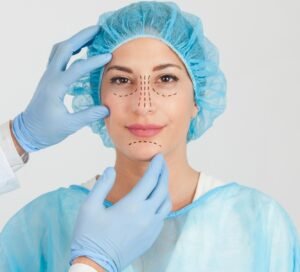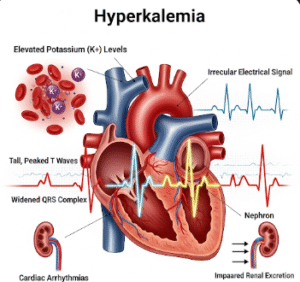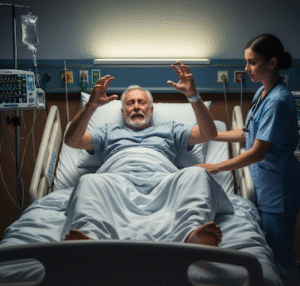➤ Overview
Sudden confusion, medically referred to as delirium, is an acute disturbance of attention, awareness, and cognition. It often develops over hours to days and can be caused by underlying medical, neurological, or metabolic conditions. Delirium is particularly common among older adults, hospitalized patients, or those with pre-existing health conditions.
In South Korea, sudden confusion is evaluated promptly in hospitals and emergency care settings using clinical assessment, laboratory tests, and neuroimaging. Early recognition and treatment are essential to reduce complications, prevent long-term cognitive decline, and address underlying causes.
➤ Key Facts
→ Delirium affects both younger and older adults, but incidence is highest among elderly patients.
→ It is often underdiagnosed because symptoms can fluctuate and mimic dementia or psychiatric conditions.
→ Causes are frequently medical or metabolic, including infections, electrolyte imbalances, or medications.
→ In Korea, evaluation includes physical examination, mental status assessment, blood work, and imaging.
→ Delirium can be reversible if the underlying cause is promptly treated.
→ Risk factors include older age, pre-existing cognitive impairment, severe illness, surgery, or intensive care stay.
→ Complications may include falls, longer hospital stays, functional decline, or mortality if not managed early.
➤ What is Sudden Confusion (Delirium)?
Delirium is an acute change in mental status characterized by impaired attention, awareness, and cognition. It differs from dementia in that it:
→ Develops rapidly – over hours to days.
→ Fluctuates in severity throughout the day.
→ Has a reversible or treatable cause in many cases.
→ Can present as hyperactive delirium – agitation, restlessness, or hallucinations.
→ Can present as hypoactive delirium – lethargy, decreased responsiveness, or withdrawal.
→ Mixed-type delirium – fluctuates between hyperactive and hypoactive states.
Korean neurologists and geriatricians evaluate attention, orientation, memory, and behavior to diagnose delirium and distinguish it from other cognitive disorders.
➤ What Symptoms are Related to Sudden Confusion?
Delirium manifests with a variety of cognitive, behavioral, and physical symptoms:
→ Confusion or disorientation – Difficulty recognizing time, place, or people.
→ Inattention – Trouble focusing, following instructions, or responding appropriately.
→ Memory impairment – Short-term memory loss or forgetfulness.
→ Altered consciousness – Drowsiness, lethargy, or hyperalertness.
→ Hallucinations or delusions – Seeing or hearing things not present.
→ Agitation or restlessness – Pacing, shouting, or trying to remove medical devices.
→ Sleep-wake cycle disturbances – Daytime drowsiness, nighttime wakefulness.
→ Emotional changes – Anxiety, fear, irritability, or mood swings.
→ Physical signs – Rapid heartbeat, sweating, or tremors if caused by systemic illness.
➤ What Causes / Possible Causes?
Delirium often results from multiple interacting factors, including medical, neurological, and environmental triggers:
→ Infections – Urinary tract infections, pneumonia, sepsis.
→ Medications – Sedatives, anticholinergics, opioids, or polypharmacy in elderly patients.
→ Metabolic or electrolyte imbalances – Low sodium, low calcium, or dehydration.
→ Acute medical illnesses – Heart attack, stroke, liver or kidney failure.
→ Neurological disorders – Parkinson’s disease, Alzheimer’s disease, stroke, or head injury.
→ Surgery or hospitalization – Especially in ICU or post-operative settings.
→ Substance use or withdrawal – Alcohol, benzodiazepines, or illicit drugs.
→ Environmental factors – Sleep deprivation, sensory deprivation, or ICU environment.
→ Severe pain or emotional stress – Can precipitate delirium in vulnerable individuals.
➤ When Should I See My Doctor?
Sudden confusion is a medical emergency, requiring immediate evaluation:
→ Abrupt onset of confusion or disorientation.
→ Fluctuating alertness or consciousness.
→ Hallucinations, agitation, or aggressive behavior.
→ History of recent surgery, infection, or medication change.
→ Signs of underlying medical illness – Fever, rapid heart rate, shortness of breath.
→ Vulnerable populations – Older adults, critically ill patients, or those with pre-existing cognitive impairment.
→ Any sudden cognitive change that is unexplained or alarming.
Prompt medical attention can prevent complications, shorten hospital stay, and improve outcomes.
➤ Care and Treatment
Management of delirium involves addressing the underlying cause, supportive care, and monitoring:
→ Identify and treat underlying cause – Infection, metabolic imbalance, or medication side effect.
→ Supportive care – Hydration, nutrition, and maintaining normal sleep-wake cycles.
→ Environment optimization – Well-lit rooms, familiar objects, and minimizing noise to reduce confusion.
→ Behavioral management – Calm reassurance, gentle guidance, and avoiding restraints unless necessary.
→ Medication adjustment – Review medications contributing to delirium and modify as appropriate.
→ Monitoring – Frequent assessment of cognitive function and vital signs.
→ Family involvement – Presence of family members to orient and reassure patients.
→ Psychiatric consultation – For severe agitation or hallucinations requiring medical intervention.
➤ Treatment Options in Korea
South Korea provides advanced care for delirium in hospitals, ICUs, and geriatric care centers:
Diagnosis in Korea
→ Clinical evaluation – Mental status exams, confusion assessment methods, and neurological assessment.
→ Laboratory tests – Blood tests, electrolytes, liver and kidney function, infection markers.
→ Imaging – CT or MRI to detect strokes, brain lesions, or trauma.
→ Medication review – Identifying drugs that may trigger delirium.
Medical Treatments in Korea
→ Treatment of underlying cause – Antibiotics for infections, fluid correction for dehydration, electrolyte replacement.
→ Supportive therapy – Oxygen, IV fluids, and nutritional support.
→ Pharmacologic management – Antipsychotics or sedatives for severe agitation under medical supervision.
Advanced Therapies in Korea
→ ICU protocols – Preventive measures including sleep management, early mobilization, and cognitive stimulation.
→ Multidisciplinary care – Collaboration between neurologists, psychiatrists, geriatricians, and nurses.
→ Rehabilitation programs – Cognitive therapy and functional support post-delirium.
Rehabilitation & Support in Korea
→ Education for families and caregivers on delirium prevention, orientation, and early recognition.
→ Long-term monitoring to prevent recurrence and manage cognitive recovery.
→ Integration of hospital care and community support to maintain patient safety and quality of life.



